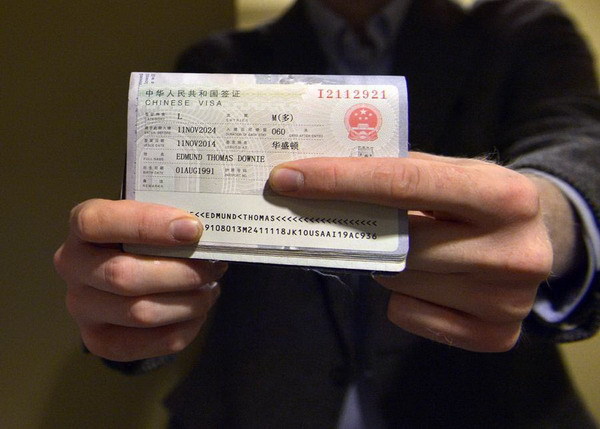Visa deal more than just jobs and trade

|
|
| Edmund Thomas Downie shows his visa to the press after becoming the first American citizen to be issued a ten-year visa at the Visa Department of the Chinese Embassy to the United States in Washington D.C., Nov 12, 2014. China issued the first-ever group of visas with ten-year validity to US citizens on Wednesday, implementing a new agreement that is expected to boost exchange between the two countries.[Photo/Xinhua] |
The same is true on the US side. To many in the US, the image they have of China still looks like the country was 30 years ago, the unprecedented transformation of Chinese society over those years seemingly never happened. I am not talking about my experiences of being asked such things as whether China is part of Hong Kong, the ignorance displayed about China among US lawmakers at hearings on China is often staggering.
Polls show that favorable sentiments toward each other are declining among Chinese and Americans. Clearly, more people-to-people exchanges are urgently needed if the two nations want to expand cooperation and effectively manage their differences. In this sense, the visa agreement is a timely and long-term lubricant to facilitate better ties. No one can guarantee that people will have a favorable view after visiting a nation, yet that view is likely to be more relevant, balanced or nuanced, and is less likely to sound "foreign" to people in the other nation.
When Edmund Downie, a graduate from Yale University, became the first American to receive a 10-year tourist visa at the Chinese embassy consular section in Washington on Wednesday, journalists, including myself, were amazed to hear him speak fluent Chinese during the interview. The 23-year-old is making his fifth trip to China next Monday and plans to go again next July.
Seeing Downie reminded me of Obama's first trip to China in November 2009 when he announced he was sending 100,000 American students to China over a period of four years. Having met many students going to China under that initiative, I have no doubt that the next generation of American leaders will understand China much better. That is equally true on the Chinese side, with some 230,000 Chinese students pursuing various degree programs in US universities and colleges.
Due to the different cultures, history, traditions and political systems, differences between China and the US will continue to exist for a long time to come. But better understanding of one another will increase the ability to manage and narrow these differences.
In this sense, the significance of the visa agreement goes far beyond the extra revenues and jobs created for the tourism industry and other sectors.
The author, based in Washington, is deputy editor of China Daily USA. [email protected]


































